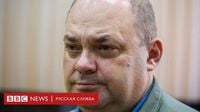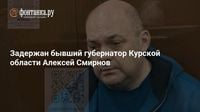On April 16, 2025, former Governor of the Kursk Region, Alexey Smirnov, was detained on charges of fraud involving over 1 billion rubles. This significant development comes just months after Smirnov resigned from his position, having served only seven months in office. A Moscow court has ordered his pre-trial detention for two months as investigations unfold.
Smirnov's political career, which began in earnest when he was appointed acting governor in May 2024, ended abruptly in December of the same year. His resignation followed a series of controversies, including accusations of poor management during the ongoing conflict with Ukraine. During his brief tenure, he garnered 65% of the vote in gubernatorial elections held in September 2024, despite the challenging circumstances surrounding the region.
According to the Ministry of Internal Affairs, Smirnov, along with his former first deputy, Alexey Dedov, is accused of leading an organized group that embezzled budget funds allocated for the construction of defensive structures near the Russian-Ukrainian border. Irina Volk, an official representative of the Ministry, stated that the funds were designated for fortifications that were never built.
The investigation into Smirnov's actions has revealed that the alleged fraud involved significant sums, with initial estimates suggesting that the embezzlement could amount to around 800 million rubles. The case has drawn attention not only due to the amount involved but also because it implicates other officials, including Vladimir Lukin, the former General Director of the Corporation for the Development of the Kursk Region, who has also been arrested.
Reports indicate that Lukin provided incriminating evidence against Smirnov, suggesting that the fraud was part of a larger scheme involving fictitious contracts and the creation of shell companies designed to give the appearance of legitimate construction work. This scheme allegedly resulted in the region's budget losing over 3.2 billion rubles.
During Smirnov's time in office, the Kursk Region faced numerous challenges, particularly regarding its defense against incursions by Ukrainian forces. In August 2024, as tensions escalated, Smirnov's administration struggled to manage the situation effectively, leading to public outcry and dissatisfaction among the residents, particularly those in border areas.
In December 2024, following widespread criticism and protests from refugees who accused the government of inadequate defense measures, Smirnov announced his resignation, claiming it was by the decision of the leadership. However, the circumstances surrounding his departure suggest it may have been a forced resignation.
Political analysts noted that Smirnov's brief term placed him third in an unflattering ranking of regional leaders based on the duration of their service, with only 200 days in office and just 88 days as an elected governor. His predecessor, Roman Starovoit, had served as governor since 2018 before transitioning to a federal role.
After Smirnov's resignation, Alexander Khinshtein was appointed as the new head of the region, tasked with crisis management amid ongoing military conflict. Khinshtein emphasized the need for urgent recovery efforts in the region, particularly in restoring housing and infrastructure damaged by the conflict.
As the investigation continues, authorities have indicated a willingness to cooperate fully, with Khinshtein stating that the regional government intends to assist the inquiry into the alleged fraud. This commitment to transparency marks a notable shift in the handling of such cases, particularly in light of the serious allegations against former officials.
Moreover, the situation has raised questions about the overall governance and management of the Kursk Region, especially during a time of heightened military activity. The failure to effectively communicate with residents and manage the logistics of evacuation during the conflict has further fueled criticism of Smirnov's administration.
In the wake of the fraud allegations, many are calling for a thorough investigation into the activities of the Corporation for the Development of the Kursk Region, which was responsible for overseeing the construction projects in question. The scrutiny of this organization is expected to reveal further details about the management of public funds and the accountability of officials involved in the decision-making process.
As the legal proceedings against Smirnov and Dedov unfold, the implications for regional governance and the public trust in local leadership will likely be significant. The case serves as a stark reminder of the potential for corruption within government ranks, especially in times of crisis.
With the ongoing war and its repercussions still fresh in the minds of residents, the actions of public officials in the Kursk Region will be closely monitored as citizens demand accountability and transparency in their government.
As the investigation progresses, the outcomes will not only impact the individuals involved but may also set a precedent for how similar cases are handled in the future, particularly in regions facing unique challenges like those in Kursk.









